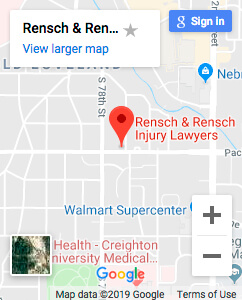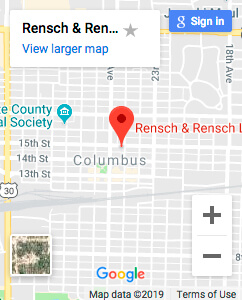College and Student Personal Injury
OMAHA, Nebraska. Parents send their kids away to college with the expectation that they will be safe. They may assume that dorm staff, teachers, and other support staff will be there for their children. Parents may expect—reasonably—that they will be contacted if their children are not doing well, or if they need additional support. Yet, a recent article in the New York Times, highlights the fact that some students don’t always receive the support they need, and parents may not always be aware of their children’s risk for suicide and depression. In fact, according to the New York Times, when students seek psychological help or when students are at risk of failing school, parents may not always be informed.

An irresponsible texting driver is about to run over a pedestrian at an intersection which shows how dangerous texting and driving is. Stop the text and stop the wrecks.
Colleges treat their enrolled students like the adults that they are. In fact, there are laws in place that bar schools from releasing information to parents without the student’s consent. Yet, there are exceptions to the law. If a parent claims a student on his or her tax forms, if the student signs a consent form, or if there is a health and safety emergency, the school may contact parents. Here mental illness, depression, and psychological concerns may not be taken seriously enough.
However, when many parents are footing the college bill, some may believe or expect that there will be more channels of communication open than there may, in fact, be. With suicide being the second-greatest leading cause of death among college-age adults, many parents are demanding that colleges take better steps to protect their students.
Yet, what can parents do legally, if a child commits suicide or hurts himself or herself? According to a recent case, the Massachusetts Supreme Court found that M.I.T. could not be found responsible for a student’s suicide. However, the court found that the school could be considered liable if the student told staff or medical personnel that he or she planned to commit suicide. So, if your child was hurt or killed due to suicide or self-harm, a parent could pursue a wrongful death or personal injury case, but not a criminal case against the school.
Lawyers who have handled these kinds of cases believe that colleges should have a clearer protocol in place to protect students who are in distress and also to alert parents.
So, what can parents do if they are concerned about their children’s safety? According to the Centers for Disease Control, risk factors for suicide include family history of suicide, previous suicide attempts, history of depression or other mental illness, substance abuse, feelings of hopelessness, isolation, or other losses. Students may be struggling in college without their parents knowing and they may be ashamed or afraid to speak up. This is why parents and schools both have a responsibility to identify students who may be at risk. When both support systems work in concert, students have a better chance of getting the support they need and deserve.
If your loved one attempted suicide or committed suicide on a college campus, and the college was aware of your child’s suicide risk, you may have the right to seek damages. The hope is that as more parents raise awareness and seek justice for this issue, it will motivate more colleges to set up standards for contacting parents when students are in distress. If you have questions, contact Rensch & Rensch Law, personal injury lawyers in Omaha, Nebraska today. You can also visit us at https://www.renschandrensch.com/ to learn more about how we may be able to help your family seek justice and raise awareness for this important issue.
Rensch & Rensch Law
7602 Pacific Street,
Suite 102
Omaha, NE 68114





